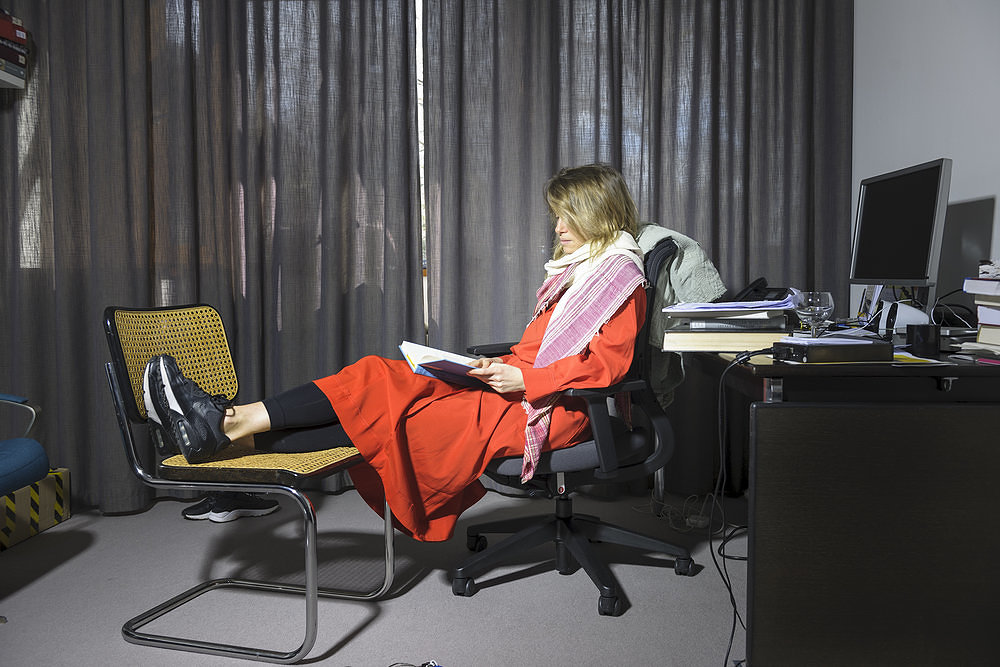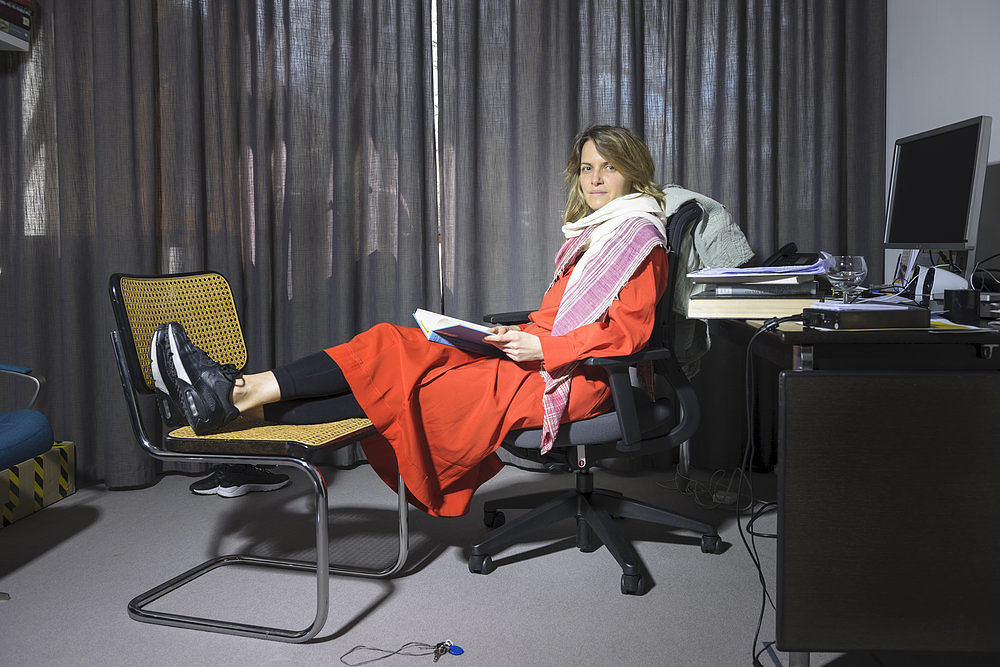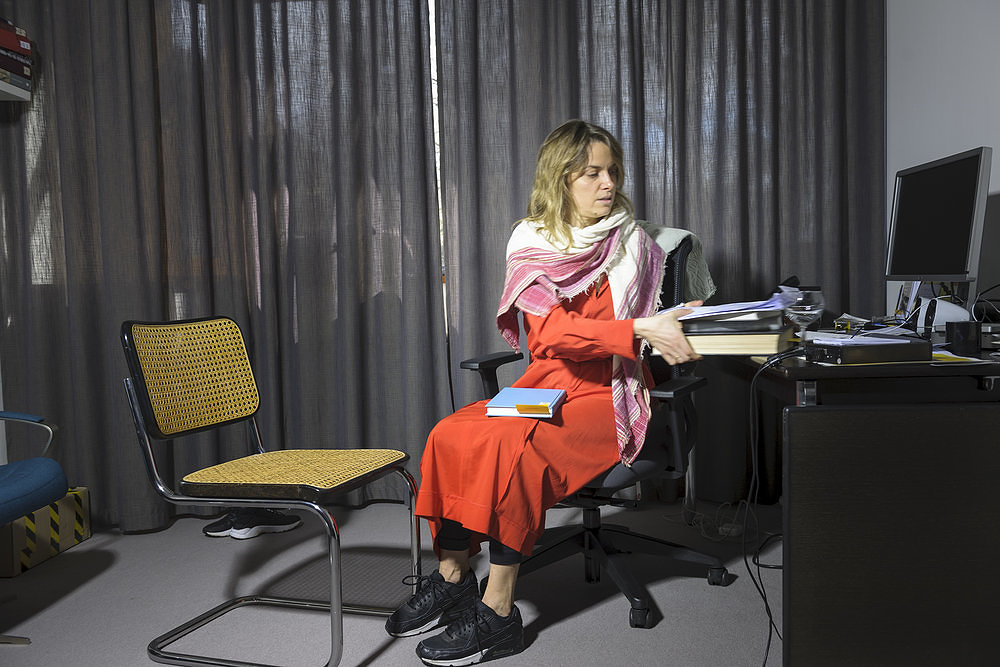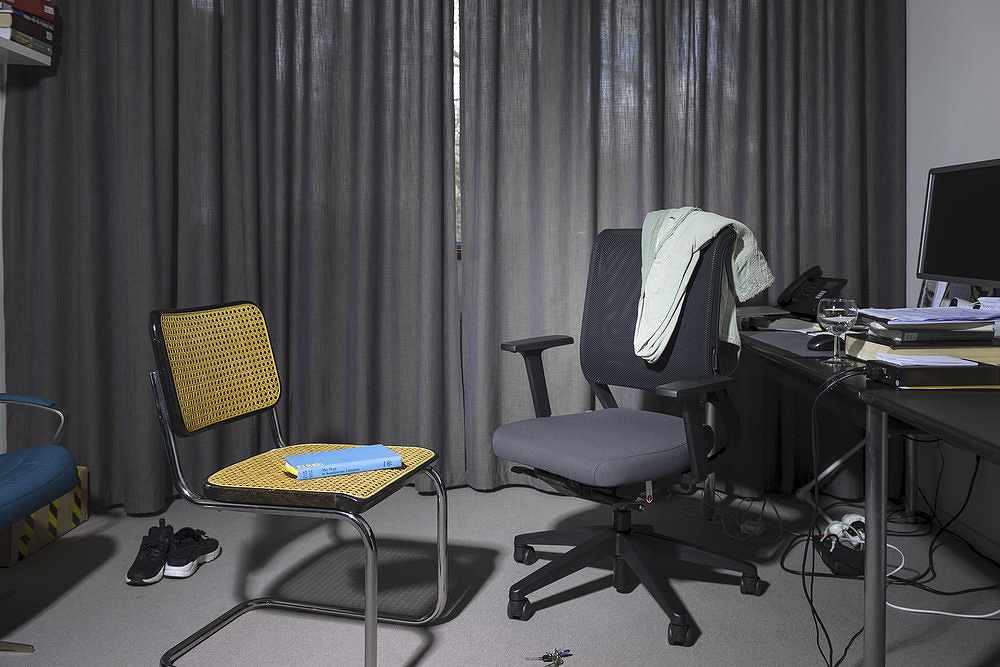Issue 12 / June 2017
Bonjour Tristan
by Hans-Joachim Neubauer
Julia Voss investigates the life and work of the Swedish painter Hilma af Klint
First let’s say hi to Tristan Otto. The tyrannosaur, or rather his black skeleton, is at the back of the first floor of Berlin’s Naturkundemuseum and he’s brandishing his chops. These must have left quite an impression 66 million years ago. Julia Voss tilts back her head – the twenty-first century meets the Cretaceous period. A sign explains that the 12-meter-long giant was named for the owner’s sons. Voss grabs her cellphone and starts googling. It turns out that Tristan belongs to a pair of London investment bankers. New money for old bones. Can a fossil serve as metaphor? And if so then what might it stand for? The financial system? Voss laughs, tucks her cell away, and moves on in sneakers of silver, orange and green. Evolution is most definitely more than just a theory about the past.
Julia Voss is culture & entertainment editor of the Frankfurter Allgemeine Zeitung. The Wissenschaftskolleg invited the art critic to Berlin to work on her book on the Swedish painter Hilma af Klint, an early abstract artist and for too long an unappreciated genius. Today she is a thorn in the side of art historians. But what are we doing here with Tristan? And what can we learn from the long extinct Tasmanian tiger? Tristan and the tiger are testimony to the course of evolution. Variation, natural selection – paleobiologists tell stories of way back when, their subject is earthly life, its origins and development. And Julia Voss has investigated just how that greatest of all naturalist narrators, Charles Darwin, conveyed his tale to the world. By means of pictures. Art history as epistemic science. Voss is assistant departmental manager of her newspaper, also honorary professor in Lüneburg, but among the dinosaurs she’s equally in her element.
Behind the glass cabinet containing the stuffed Tasmanian tiger is a plaster cast of the master himself. In the adjacent cabinet is a diagram of the human genome with all manner of data pertaining to our central code. A young girl and boy pass by, they marvel at Darwin’s beard, then continue on their way. Voss explains how Darwin thought and worked, how he developed the evolutionary model parallel to and then in tandem with Alfred Russel Wallace. She has had an intimate acquaintance with Darwin for a very long time now. She did research on him at the Max Planck Institute for the History of Science and in 2005 received her doctorate from Humboldt-Universität for a dissertation on the debate over Darwinism, a study which gained her the coveted Otto Hahn Medal. In 2007 she published Darwins Bilder. Ansichten der Evolutionstheorie 1837–1874 (Darwin’s Pictures: Views of Evolutionary Theory 1837-1874). Just read the book and you’ll grasp the extent to which the British naturalist used pictures in conceiving his theories. These photos, engravings, drawings and sketches impact our image of the story of life on earth to this very day.
In her book, from a completely new standpoint, Voss relates the mental journey traveled by this bold and liberating thinker. So it’s no accident that we now pay a visit to the crested argus, cousin of the great argus. We behold the animal’s luxuriant plumage and Voss explains how Darwin, in the second edition of his Descent of Man, presented argus males in the midst of their courtship displays together with hens not so as to illustrate the entrancing beauty of these creatures but to serve as visual models for the phenomenon of natural selection. In contrast to the strutting males the females appear very plain – but in truth it is they who are the true agents of the selection process, it is they who have the power of choice. In picking a partner they employ their taste in what strikes them as beautiful. But doesn’t everyone know that? Voss says: Today they do! Voss explains the care with which the media-strategist Darwin chose his pictures. Also as an illustration the great argus had to go through a tough selection process. It is one of the very few motifs Darwin employed to illustrate natural selection. This founder of modern evolutionary biology purposely avoided blood-soaked pictures of predators and their victims. For Darwin natural selection was not what later social Darwinists would regard as a battle between individuals where only the strongest win out. No – Charles Darwin’s natural selection was based on variation. Those animals which best adapt to their environment are the ones that flourish. Only the beautiful cocks become fathers. In the subtitle to his Descent of Man, Darwin called this phenomenon “Selection in Relation to Sex.” Adaptation instead of optimization. Tristan might be big, but he’s dead.
Julia Voss walks through the Naturkundemuseum and the objects begin to speak. That’s simply what transpires when a historian of art and science checks out her surroundings. Exhibits are given a context. “That’s the most beautiful one,” says Voss pointing at a glass case. We are standing before a reproduction of Darwin’s famous tree-of-life sketch from 1837, his very first. Beneath the words “I think” he drew a few lines to sketch an abstracted genealogical tree and thereby illustrate the evolutionary principle – with the letters A, B, C and D standing for the various species. A eureka moment in the history of biology. This page from Darwin’s notebook signaled the triumphal procession of a metaphor, of a model, of a picture illustrating an idea. The words “I think” at apex of the sketch are the quintessence of that species which lays claim to the very top branch of the tree of life. “It almost looks like conceptual art,” says Voss, “an epistemically beautiful moment.”
Beautiful episteme: In the grandiose in-vitro hall of the museum we see creatures preserved in alcohol, livid representatives of their respective species, thousands of dead witnesses to life’s diversity. “Disorder,” says Voss, “that’s nature.” These naked and lonely creatures in their glass jars are an outlandish sight. The many kids making a happy racket in other parts of the museum are suddenly much quieter when they enter this hall. A reflective moment? Voss says that Darwin at least had respect for religion and didn’t see himself as its opponent. Then she recalls that time when she traveled to Santee, California, not far from San Diego, to visit the Museum of Creation and Earth History, which might be termed the religious counterpart to our present venue. Bible-abiding creationists believe that the earth is between 4000 and 6000 years old. Voss asked one of them how Noah managed to get dinosaurs onto his ark, and the answer was not illogical – “In eggs!”
Later sitting on the big round sofa in the museum’s stairwell and the children are screaming and laughing again. And again, the disk with the outer-space film descends from above and hovers over twenty people seated on the sofa, going back in time, and then showing the universe. Two girls huddle together and gaze upward. Through half-closed eyes Voss glances their way: “Art museums can only dream of this kind of thing.” What thing? “This smell, this locker-room flair, the excitement, the squeak of sneakers on the floor.” Natural history museums are places for children, places of wonder and learning; art museums smell of perfume, gray hair and edification. Above us the cosmos prepares to descend on us and the countdown begins with the children counting along. Then comes the Big Bang. Billions of years pass in a matter of seconds while the children hold their breath. Voss tells of Hilma af Klint, of the symbols in her paintings, of her experiments with form, of the sheer size of her pictures. Klint was inspired by spiritual experiences and cosmological ponderings. “When you hang her paintings as they’re meant to be hung then you see that they compose series which describe certain developments. She transposed evolutionary thought to art.”
Supernovas lurch through chaos, boulders zinging about, comets on elliptical trajectories, disorder and disarray. “For Hilma af Klint not only does the organic world evolve but the cultural one as well – and its art along with it.” A few million years pass by, the two girls next to us are rapt. “Hilma af Klint was sure that she was the beginning. She was certain that someday the invisible worlds would be as clearly reproducible as the visible ones.” Insight into time then shifts into a view of space, the monitor screen slowly floating upward again. Candy wrappers fly through the air, microcosmos meets macrocosmos, universal order everywhere you look. Where are we and who are we? Voss brushes a strand of hair from her face. “Hilma realized that she was ahead of her time,” says Voss, “and she was right.”
Tristan is still standing there and being marveled at as one evolution’s tragic losers. His mission: to terrorize. His descendants: chickens. If he wasn’t so big then he likely wouldn’t even be here. What do we want to see? What not? What’s sensational, what will be forgotten? Hilma af Klint was doing abstract paintings as early as 1906, some years before Wassily Kandinsky and František Kupka. She kept her work under wraps and mandated that this should remain so for up until twenty years after her death. Does art without a market have any place in the canon? “When you have a Kandinsky going for 80 million, no one wants an outsider, some new Swedish woman, who undermines the whole story of men inventing abstract painting in 1910 and 1911. Voss wants to correct and expand the canon for Hilma af Klint. “Who writes art history and what are the interests involved?” Voss knows whereof she speaks. Together with her illustrator husband Philipp Deines she composed the book Hinter weißen Wänden: Behind the White Cube, a passionate meditation on the art market, the canon and criticism in times of big money. The market is hardly “natural” and not at all “evolved” but rather the result of uncompromisingly brokered interests. Survival of the fittest? Do only the best ever get ahead? “No”, Voss shakes her head. It’s not as simple as that. “The question is which narrative comes out on top and which doesn’t.” It’s worth inquiring as to the beneficiaries of the situation – as to the cui bono: “For just whom is the system designed?”
Bye-bye Tristan. Outside the spring weather is beckoning, Berlin is in a cheerful mood, and Voss must go. Her Swedish course begins in an hour. Next month she is traveling to Sweden to meet with Klint’s relatives and do research in the museums and archives. What would she ask the painter if she could somehow meet her there? Voss likes the question. “For one, I would ask her when exactly she took certain trips; that information is hard to gather.” And for another? A pause – then she laughs and says: “I think . . . I think I’d ask her what she thought of Wassily Kandinsky’s paintings.”
More on: Julia Voss
Images: © Maurice Weiss



